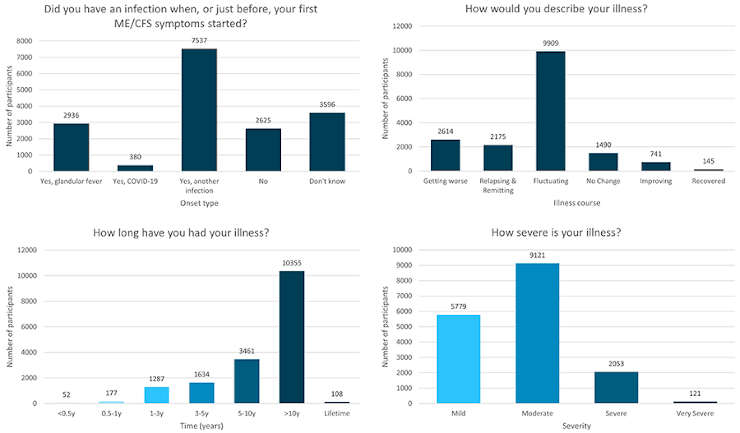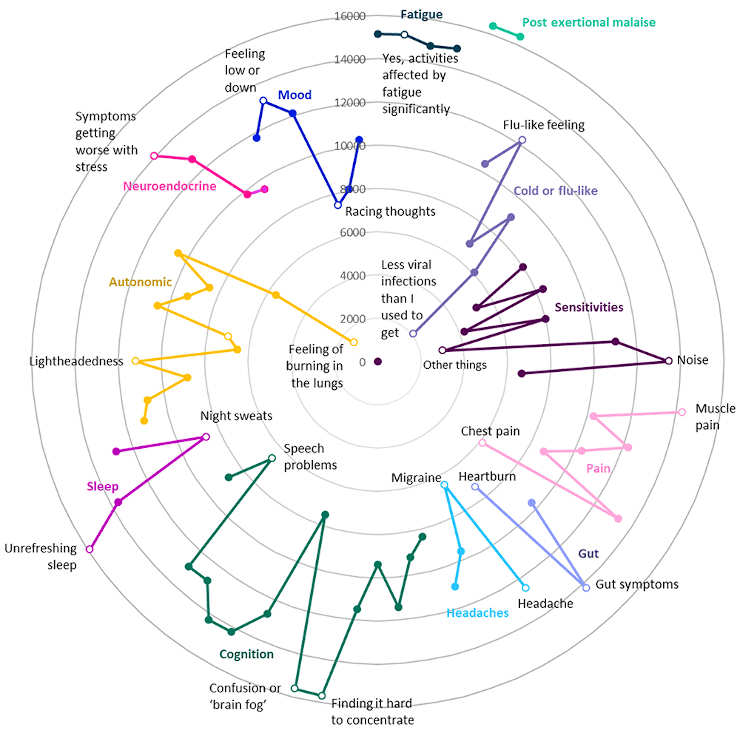It has long been known that women are more likely to have myalgic encephalomyelitis, also known as chronic fatigue syndrome (ME/CFS). Now, a new study by researchers at the University of Edinburgh has found that women tend to experience more symptoms and co-occurring conditions than men do with ME/CFS.
According to initial results from the world’s largest study of the disease, women who have had myalgic encephalomyelitis for more than ten years are more likely to experience increasingly severe symptoms as they age.
Myalgic encephalomyelitis is a long-term neurological condition where normal exertion levels can trigger an excessive increase in symptoms. According to experts, the first step in creating efficient treatment options is to understand better how ME/CFS affects people.
DecodeME
DecodeME is a large population-based study. Experts examined anonymous survey questionnaires from myalgic encephalomyelitis patients. More than 17,000 sufferers of ME/CFS have already answered the DecodeME survey.
The survey asked how long the responder experienced ME/CFS symptoms, when they were diagnosed, and if they had any co-occurring disorders.

The study team is requesting that more UK-based ME/CFS patients who are 16 years of age or older participate in the study in order to further their efforts.
The ultimate aim of the DecodeME project is to address the question of whether different ME/CFS types exist that are linked to different causes and if different types of ME/CFS need different treatments or have different chances of recovery.
Additional Medical Conditions
The study confirmed the well-known gender bias among ME/CFS patients, with women constituting 83.5% of responses.
Additionally, at least one active co-occurring condition was reported by two-thirds (66.7%) of women and slightly more than half (52.7%) of men. Likewise, 39.2% of women and 28.6% of men reported having at least one inactive co-occurring ailment.
If a participant had experienced symptoms in the previous six months, a condition was considered active. IBS was the most prevalent active co-occurring disorder (41.3%), followed by clinical depression (32.4%), fibromyalgia (29.5%), anemia (14.1%), and hypothyroidism (12.8%).
More Symptoms

Women also reported 42 symptoms on average, compared to 36 for males. The most common of these symptoms were brain fog – a term commonly used to describe individuals’ cognitive impairment – unrefreshing sleep, and muscle soreness.
Participants were also asked to identify the severity of their disease using classifications from the UK’s National Institute for Health and Care Excellence (NICE) standards, ranging from mild to very severe.
Experts determined that having ME/CFS for more than ten years and being a woman are risk factors for developing a severe illness, with symptoms getting worse with age.
The project’s next phase will involve experts analyzing at least 20,000 different DNA samples to determine whether the illness is partially genetic and, if so, investigate its cause.
Myalgic Encephalomyelitis Impacts
In the UK alone, it is estimated that more than a quarter of a million people, of all ages, and from all socioeconomic and social backgrounds, are affected by myalgic encephalomyelitis. Its identifying feature, known as post-exertional malaise, is a delayed severe development of symptoms after little physical exercise.
Pain, brain fog, and significant energy limitation that does not improve with rest are some of the other symptoms. There are no known causes, and there is currently no diagnostic test or cure.
“ME/CFS is a devastating disease affecting a UK population the size of Derby. We discovered that the disease is worse for women, in older people, and many years after their ME/CFS started. Our hope is that DecodeME’s genetic results will shed light on why certain groups are more susceptible to ME/CFS than others,”
said Professor Chris Ponting, study lead from the MRC Human Genetics Unit at the University of Edinburgh’s Institute of Genetics and Cancer.
These results show the very serious effects ME/CFS has on women, who are disproportionately affected.
“It’s important to also recognize the impact that it has on men who have ME/CFS, and we thank the 20,000 men and women who have already signed up to take part in this very important study,”
said Sonya Chowdhury, Chief Executive of Action for M.E. and Chair of the Management Group of the study.
Abstract
Background: People with myalgic encephalomyelitis / chronic fatigue syndrome (ME/CFS) experience core symptoms of post-exertional malaise, unrefreshing sleep, and cognitive impairment. Despite numbering 0.2-0.4% of the population, no laboratory test is available for their diagnosis, no effective therapy exists for their treatment, and no scientific breakthrough regarding pathogenesis has been made. It remains unknown, despite decades of small-scale studies, whether individuals experience different types of ME/CFS separated by onset-type, sex or age.
Methods: DecodeME is a large population-based study of ME/CFS that recruited 17,074 participants in the first 3 months following full launch. Detailed questionnaire responses from UK-based participants who all reported being diagnosed with ME/CFS by a health professional provided an unparalleled opportunity to investigate, using logistic regression, whether ME/CFS severity or onset type is significantly associated with sex, age, illness duration, comorbid conditions or symptoms.
Results: The well-established sex-bias among ME/CFS patients is evident in the initial DecodeME cohort: 83.5% of participants were females. What was not known previously was that females tend to have more comorbidities than males. Moreover, being female, being older and being over 10 years from ME/CFS onset are significantly associated with greater severity. Five different ME/CFS onset types were examined in the self-reported data: those with ME/CFS onset (i) after glandular fever (infectious mononucleosis); (ii) after COVID-19 infection; (iii) after other infections; (iv) without an infection at onset; and, (v) where the occurrence of an infection at or preceding onset is not known. Among other findings, ME/CFS onset with unknown infection status was significantly associated with active fibromyalgia.
Conclusions: DecodeME participants differ in symptoms, comorbid conditions and/or illness severity when stratified by their sex-at-birth and/or infection around the time of ME/CFS onset.
Reference:
- Bretherick AD, McGrath SJ, Devereux-Cooke A et al. Typing myalgic encephalomyelitis by infection at onset: A DecodeME study [version 4; peer review: 2 approved]. NIHR Open Res 2023, 3:20
